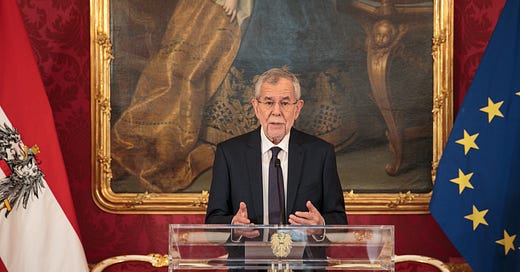Clear the Field
66 percent of Austrians want the incumbent president, Alexander Van der Bellen, to run for a second term in the fall of 2022
Servus!
Sometime in the fall of next year, Austrians will vote in the next presidential election. There is something of a tradition of incumbents winning second terms: Adolf Schärf in 1963; Franz Jonas in 1971; Rudolf Kirchschläger in 1980; Thomas Klestil in 1998; and Heinz Fischer, who received nearly 80 percent of votes cast in 20101. To that list, we may soon be able to add the current office holder, Alexander Van der Bellen, who appears a shoo-in for another six years in the Hofburg—should he so desire it.
A recent survey conducted by Market-Institut for the Standard found that 66 percent of Austrians want Van der Bellen to run again in 2022. That wish cuts across gender and party lines: a majority of People’s Party (ÖVP, 63 percent), Social Democratic Party (SPÖ, 80 percent), NEOS (80 percent), and Green (99 percent) voters want Van der Bellen’s name on the ballot. Only Freedom Party (FPÖ) voters are opposed—unsurprising, given it was the former FPÖ leader Norbert Hofer who, in 2016, ran Van der Bellen close in the race for the Hofburg, in the end losing 47 percent to Van der Bellen’s 53 percent in the contest’s second round.
What accounts for his popularity, as Market-Institut found, is that Austrians tend to see Van der Bellen as being above the fray, acting in the interests of the republic and all Austrians as opposed to one political faction or another2. This impression likely crystallized during the constitutional crisis of 2019, when the Ibiza affair triggered a vote of no confidence in chancellor Sebastian Kurz’s ÖVP-FPÖ coalition and the establishment of a caretaker government made up of experts sworn in by the president. It was Van der Bellen who guided the country through this rocky, unprecedented period in the history of the Second Republic3.
Van der Bellen has not yet declared if he intends to run for re-election. He will be 78 by the time of the next vote, and one must keep in mind another Austrian tradition, that of presidents dying in office, a fate which befell Franz Jonas in 19744. His hesitation on the one hand and popularity on the other mean other possible candidates, in particular those associated with the SPÖ and ÖVP, have hitherto been reluctant to jump into the fray. So far, all we can say for certain is that the FPÖ will put up a candidate and that it is likely to be Hofer again.
The ÖVP’s Wolfgang Sobotka and the SPÖ’s Doris Bures—speaker and deputy speaker of the lower house of the Austrian parliament respectively—have both indicated in one way or another that they would not run against Van der Bellen, as has the NEOS’s Irmgard Griss, who also ran in 2016. Whether or not the ÖVP or SPÖ would even bother to run candidates at all—or simply instruct voters to back the independent Van der Bellen—is a question yet to be answered, and all signs indicate that, if Van der Bellen does decide to run again, Austria’s mainstream parties may simply clear the field.
Bis bald!
Thank you for signing up to the Vienna Briefing. If you know someone who would be interested in receiving this newsletter, consider sharing it with them today.
Hallein Under Water
Extreme rainfall turned the center of Hallein, a town by the German border in the state of Salzburg, into a raging river as part of flooding that devastated parts of western and central Europe. Viennese authorities activated its flood defense mechanisms over the weekend, opening sluice gates to redirect water into the New Danube.


Going Electric
The environment ministry is exploring whether to ban the sale of polluting vehicles from 2030—five years ahead of the EU’s own target date of 2035. The transport sector accounts for one third of all greenhouse gas emissions produced in Austria.
Both Shots, Now
From August 15, only those who have been vaccinated twice will be eligible to receive a COVID ‘green pass’ in Austria, the government announced last week. More than half of the eligible population is now fully vaccinated. In spite of rising case numbers, a planned relaxation of the mask mandate is expected to proceed this week.
The only president not to win a second term in recent memory was Kurt Waldheim, a man who repeatedly lied about his wartime service in the SS and his implication in war crimes committed in the Balkans.
In 2016, Van der Bellen ran as an independent candidate backed by the Greens.
His only memorable misstep to date came in May of last year, when he broke coronavirus restrictions shortly after the first lockdown by dining too late at a restaurant in Vienna with his wife and two friends, an incident for which he apologized.
Thomas Klestil died mere months after leaving office in 2004.




